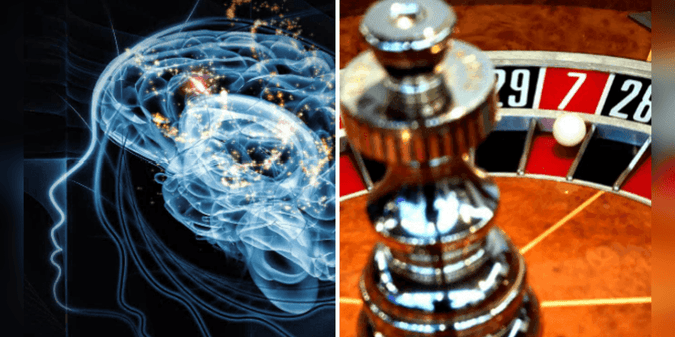Spinning the Wheel: the Hidden Psychology of Roulette

Pick your numbers, place your bets, spin the wheel, and hope for the best. On the face of it, online roulette is a pretty simple game, and you might not think that there's much psychology involved in a hobby where success is based wholly on random chance and the laws of probability. Yet there's so much going on beneath the surface. While we can’t impact the outcome of where that tiny little ball lands on the wheel, we can actually maximize our success in terms of our bankroll by avoiding some common psychological pitfalls and emotional responses that are ingrained in many of us already. Let's take a look.
The Seven Deadly Sins
Catholicism, way back in the day in the day, identified seven deadly sins that people should avoid at all costs in order to lead a happy life. These are Lust, Gluttony, Greed, Sloth, Wrath, Envy, and Pride. If modifying your own personality to ensure that none of these seven facets of life stand in the way of success is key, then the concern is that we can see how roulette punters are readily exposed to at least four of the ‘deadly sins’ every time they take to the casino!
Greed
This one speaks for itself. The random nature of roulette means that many players will enjoy what they would term ‘winning streaks’, assuming they are placing high probability wagers like red or black, of course. A streak helps to build the bankroll, but it also helps to inflate the ego too. The solution? Set yourself a target amount to win each time you hit the best live roulette casino or log on to your favorite online casino site. As soon as you've hit your ceiling, take your chips and walk away – no questions asked.
Wrath
The flipside to winning streaks is the kind of losing trend that can reduce a grown man to a blubbering wreck. Even betting red or black, which serves up a shade under 50% chance of winning, can lead to consistent losses – just think of the classic ‘head vs tails’ theory. If you flipped a coin 100 times, would it land heads 50 times and tails the same? Of course not, which is why perceived losing streaks occur.
We might swap the term ‘wrath’ for ‘tilt’, in casino parlance, which is an emotion that often leads to bad betting traits like increased stakes or a change in strategy. These are both disastrous when hunting long-term roulette success. The solution? If you feel yourself getting a little hot under the collar, step away from the table for 15 minutes or more. Grab some fresh air and a (non-alcoholic) drink, and return to the fold once the feelings of angst and wrath have dissipated.
Envy/Pride
If you're playing at a brick-and-mortar casino, you'll be joined in close proximity by other roulette players. Those guys and gals might be winning big while you’re in the midst of a downturn, and it's only natural in this scenario to feel the green monster of envy rising. Your pride will be hurt, too, as the croupier hooks your stash of chips and rakes them back to the house. The solution? Try to remember why you play free online roulette in the first place.
Presumably, it’s for the fun of the game, as it's very difficult to make a full-time living out of any casino game (although, of course, we all have the capability to land the occasional big payout). Once you've reminded yourself of your own roulette-based modus operandi, you'll become less interested in the activities of others sitting at your table. And remember: the nature of luck and randomness dictates that everyone will eventually succumb to losses as well as those wins, so there’s no need to be envious of your fellow roulette enthusiasts.
The Theory of Confirmation Bias
Do you consider yourself to be someone that ‘sticks to what they know’, rather than trying new things or exploring new possibilities? That could be a predisposition towards a particular political party, TV program, or even brand of baked beans, despite perhaps not enjoying that show as much as you used to or actively not enjoying those beans after the manufacturer changed their recipe. This is known as confirmation basis, a psychological outlook that causes us to disregard information that may challenge our set-in-stone perceptions and beliefs.
The vast majority of people are subject to confirmation bias at some point in their lives. The concern, however, is when it begins to inform our betting habits – particularly at the roulette table. And don't think you're immune just because you're experienced and know the complete roulette rules, odds, and strategies.
Confirmation bias in roulette occurs when punters bet religiously on the same individual or groups of numbers and offer up the stone-cold classic ‘Well, they’ll have to land sooner or later.’ That’s not true in any sense, so don’t let confirmation bias dictate your roulette gaming – your bankroll will see the benefit.
Try A Different Roulette Strategy
Online Roulette strategies may or may not be effective. But they put some order to the chaos. They offer a fun way to play online roulette using a structured approach. My colleagues and I have done some research on online roulette strategies. We selected the ones below since they are the most popular:
Meet The Author
Experience

Fana is a writer and content specialist who specializes in the dynamic world of international publishing. For the past few years, her area of particular interest has been in the evolution of gaming laws due to her legal background. You can catch her sailing or swimming at the nearest beach when she's not keeping up with the most recent iGaming developments or honing her poker abilities.
Read Full Bio